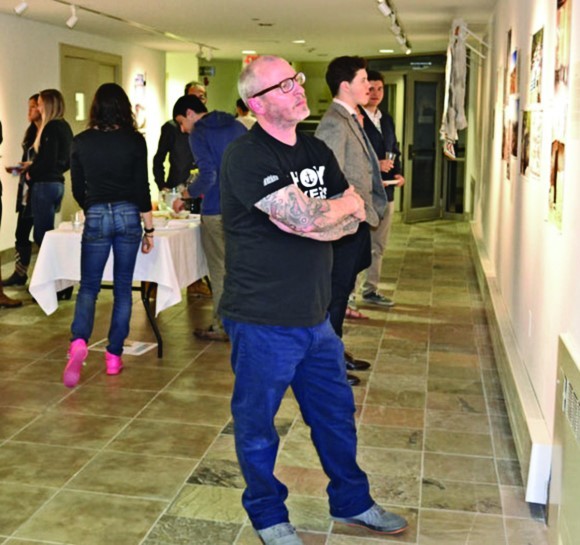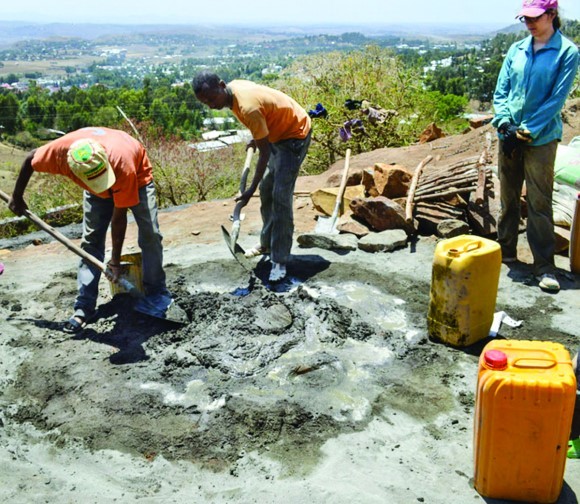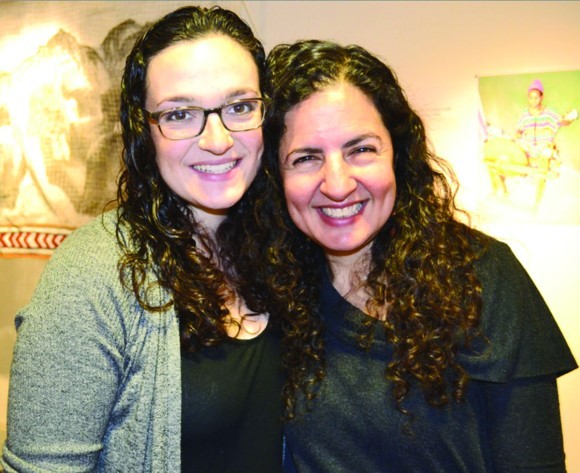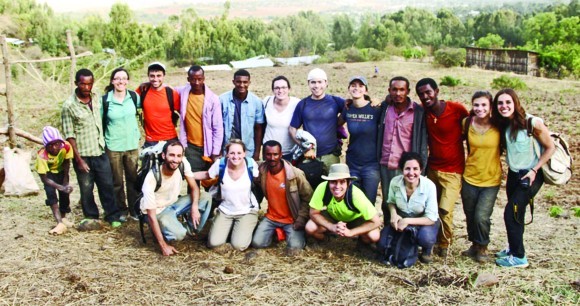Brown RISD Hillel students create exhibit based on volunteer project in Ethiopia
PROVIDENCE – A group of students from Brown RISD Hillel has created an exhibit based on their recent spring break trip to Ethiopia, where they worked with community members to restore a Jewish cemetery.
The trip was organized and supervised by Alisa Kotler-Berkowitz, Hillel’s director of engagement, and Elan Cohen, Hillel’s Israel engagement fellow. They both credit Rebecca Forman, Hillel’s engagement intern and the student coordinator of the trip, with bringing the two of them together to make the trip a reality.
According to Forman, the students wanted their volunteer project to benefit the community and not disturb local life.
“A lot of thought went into how to make this sustainable. We chose the Jewish cemetery because we weren’t coming in, then affecting children, then leaving or something,” said Forman. “Local people were directing us. We knew there was a need for it and that they would continue to keep it up after we were gone.”
Forman also noted that the Ethiopian community plans to create a network between the nation’s Jewish cemeteries in hopes that it could be a tourism draw.
During the trip, the nine students and two group leaders removed overgrown vegetation in the cemetery in the town of Azezu; they also constructed a perimeter wall.
The exhibit, featuring pictures and text telling of the students’ experiences, opened on May 6 in a hallway near the entrance of the Brown RISD Hillel. Curated by the students, the exhibit also includes three tapestries made by trip participant and RISD student Sophia Spitulnik. One tapestry depicts the history of Ethiopian Judaism, another the inside of an Ethiopian synagogue, and the third the Ethiopians’ hopes to see the Western Wall.
Also in the exhibit are transcriptions of interviews that Brown students Sam Rubinstein and Jacyln Licht conducted with some of the Ethiopian Jews, along with their pictures.
“There were a lot of recurring stories about passion to get to Israel and Judaism,” said Licht. “That was very enlightening, but as we asked more questions about family backgrounds, you learned surprising things about what families have gone through in the process of trying to get to Israel.”
“They were very actively asking for our help,” explained Rubinstein. “We came home all indignant and ready to go with the advocacy.” He then noted that two weeks after the group returned to Rhode Island, the Israeli government made an announcement that Israel planned to welcome 1,300 Ethiopian Jews this year.
“We wanted to actually represent them and … get their words out,” he said. “We just want people to know that they’re there.”
The exhibit also features text that tells the history of Judaism in Ethiopia, as well as some of the political aspects of Ethiopian Judaism.
Ethiopian Judaism is unique in that it was monastic between the 15th and 18th or 19th centuries and was not officially recognized as Judaism until the 1970s.
The idea that Ethiopian Jews – the Beta Israel, as the Ethiopian Jewish community calls itself – could not make aliyah until recently left an impression on several students, including Dani Satlow and Melissa Hill, who both attend Brown.
“A lot of the questions I had were dealing with who [is considered] a Jew. According to halakhah, it’s that your mother is Jewish. It was eye-opening to see where people couldn’t make aliyah because they weren’t considered Jewish,” said Satlow. In Ethiopia, Satlow said he witnessed a zealous congregation with congregants eager to be observant Jews. He found it hard to process that the Jewish status of those congregants could be called into question while many people who are not at all religious are free to make aliyah.
“It was a conundrum,” he said.
Hill said, “Israel had been going back and forth about whether to recognize them as Jews and that they are more observant than I’ve ever been.”
Other students recounted less political experiences. Brown student Jonathan Yakubov recalled dancing in a nightclub, and says he was struck by the friendliness of the Ethiopians.
“On the other side of the world, they still see the positive in life,” he reflected. “We were foreigners, and they were so friendly to come up to us and welcome us to dance. It was really nice.”
Cohen and Kotler-Berkowitz were thrilled with the curiosity and positive attitude that the students showed on the trip.
“Since we’ve come back … people feel so connected. We shared something that we haven’t shared with anyone else,” Kotler-Berkowitz remarked. “[Everyone had] such an incredible attitude and such presence.”
Cohen, who has supervised a number of similar trips, said, “It’s always really cool to see people discover new things, and it’s especially easy with the Brown and RISD students, who are especially inquisitive.
“We all shape each other’s experiences, and that’s a really powerful thing.”
The exhibit, at Brown RISD Hillel, 80 Brown St., in Providence, is open to the public through the end of May.
ARIEL BROTHMAN is a freelance writer who lives in Wrentham, Massachusetts.















